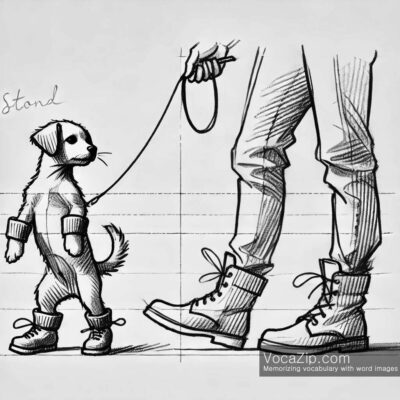stand meaning
stand :
position, support
noun
▪ He bought a music stand for his piano.
▪ He bought a support for his piano.
▪ The lemonade stand was busy.
▪ The lemonade stall was busy.
paraphrasing
▪ rack – position
▪ kiosk – support
▪ booth – position
▪ pedestal – support

stand :
to be upright, to endure
verb
▪ She stood up when the teacher entered.
▪ She got up when the teacher entered.
▪ He couldn't stand the noise.
▪ He couldn't tolerate the noise.
paraphrasing
▪ tolerate – to endure
▪ endure – to bear
▪ resist – to fight against
▪ bear – to carry
Pronunciation
stand [stænd]
The pronunciation for both noun and verb forms is the same: 'stand'.
Common phrases and grammar about stand
stand - Common meaning
noun
position, support
verb
to be upright, to endure
Part of Speech Changes for "stand"
▪ standstill (noun) – a situation with no movement or activity
▪ withstand (verb) – to stand against strong forces
▪ standout (noun) – a person or thing that is exceptionally good
▪ standard (adjective) – usual or normal
Common Expressions with "stand"
▪ stand by – to support someone
▪ stand out – to be noticeable
▪ stand up for – to defend someone or something
▪ stand in line – to wait in a queue
Important examples of stand in TOEIC
Vocabulary examples from the TOEIC test
In TOEIC word questions, stand is often used to refer to a support or position.
Example of a confusing word: stance (opinion or position)
Grammar examples from the TOEIC test
In TOEIC grammar questions, stand can function as both a noun and a verb, requiring identification of its use in sentences.
stand
Idioms and fixed expressions in TOEIC
stand out
to be noticeable, used in descriptions of people or objects.
stand your ground
to not give up your position, often used in disputes.
Differences between similar words and stand
stand
,
endure
differences
stand is used to bear or tolerate something, while endure emphasizes sustained hardship or suffering.
stand
,
He stood the bad weather.
differences
Words with the same origin as stand
The origin of stand
stand originates from Old English 'standan', meaning 'to stand, remain'.
Word structure
stand is to bear or tolerate, while tolerate specifically means to allow something to exist.
Words with the same origin
The word's root is 'stand'. Words with the same root include 'understand', 'withstand', 'standstill', 'overstand'.
Please select an image in the quiz
Previous post and next post


entertainment
572
amusement, fun
noun ┃
Views 4






